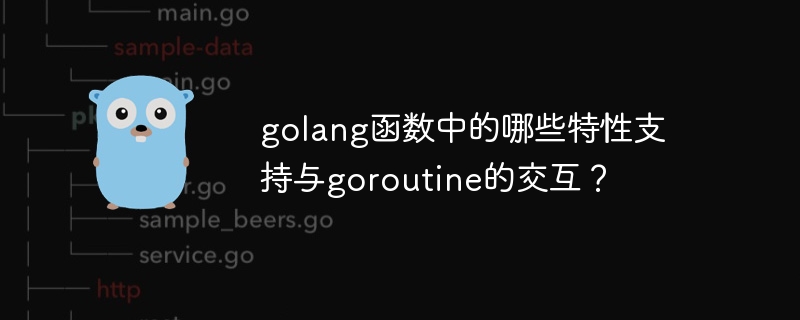Home >Backend Development >Golang >What features in golang functions support interaction with goroutines?
What features in golang functions support interaction with goroutines?
- 王林Original
- 2024-05-01 11:39:02769browse
Go functions efficiently interact with Goroutine through go, defer, and recover features. Function parameter passing supports value passing and pointer passing, and also provides channel passing. Functions can return multiple values and use named fields to improve readability. In the actual case, the function uses go to create Goroutine and transfer data through the channel to process requests in parallel.

Go function features: interacting with Goroutine
The functions in the Go language provide a series of features to support efficient interaction with Goroutine interaction. These features include:
1. Built-in functions
- go func() {}: Create a new Goroutine and immediately Begin execution.
- defer func() {}: Execute one or more defer functions before the function returns, regardless of whether the function returns normally or panics.
- recover(): Recover a panic that occurred in a function or method and return its value.
2. Parameter passing
- Value passing: passing function parameters as a copy by value will not affect the original shared between Goroutines value.
- Pointer passing: Pass function parameters as pointers, allowing Goroutine to modify the original value outside the function.
- Channel passing: Passing channels as function parameters allows Goroutine to safely send and receive data between different threads.
3. Return value
- Multiple return values: The function can return multiple values, allowing Goroutine to encapsulate the processing results into a single return value.
- Named field return value: Functions can return the value of a named field, which helps improve code readability and maintainability.
Practical case
The following is a practical case using Go function features:
// 创建一个处理用户请求的 Goroutine。
func handleRequest(w http.ResponseWriter, r *http.Request) {
go func() {
// 处理请求逻辑。
// ...
// 将结果写入响应。
// ...
}()
}In this example, handleRequest Function creates a new Goroutine using the go built-in function to handle user requests in parallel. Functions pass channels as arguments, allowing Goroutines to safely exchange data between different threads.
The above is the detailed content of What features in golang functions support interaction with goroutines?. For more information, please follow other related articles on the PHP Chinese website!
Related articles
See more- Detailed explanation of Three.js using orbit controls plug-in (orbit control) to control model interaction
- How to determine whether channel is closed in golang
- How to write interactive interface in Python?
- How to release map memory in golang?
- How do generic functions improve code readability in Go language?

